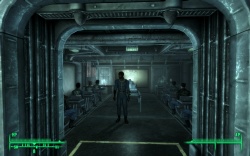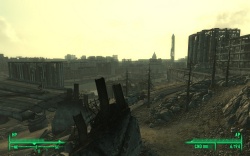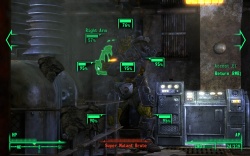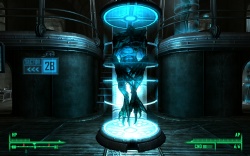|
Fallout 3
 As
narrator Ron Perlman famously says in all three of the Fallout intros: "War... war never changes."
And so it is, thankfully, with Bethesda's latest contribution to the franchise. Miraculously, they have
managed to preserve nearly everything that was good about the first two games. Though I'm sure they did
this in the knowledge that they would piss off a legion of die-hard fans had they done otherwise, it
does little to belie their achievement in this respect. As
narrator Ron Perlman famously says in all three of the Fallout intros: "War... war never changes."
And so it is, thankfully, with Bethesda's latest contribution to the franchise. Miraculously, they have
managed to preserve nearly everything that was good about the first two games. Though I'm sure they did
this in the knowledge that they would piss off a legion of die-hard fans had they done otherwise, it
does little to belie their achievement in this respect.
You see, I am one of those die-hard fans. The original Fallout
happened to be the first RPG I ever played, and it got me completely hooked on the genre. But the
mainstay of this game was its strategic turn-based combat. So how did Bethesda handle the transition
from turn-based to real time while still maintaining a strategic aspect to the combat? In a word
(or actually, four): V.A.T.S. But we'll get to that later, for we have much to discuss beforehand...
So I'll begin with an explanation of the character creation mechanics for the benefit of those who haven't
experienced Fallout before, and I'm sure there are many of you since
Fallout 2 was released exactly 10 years ago. Your character's
primary stats are determined using a system unique to the Fallout series, dubbed as S.P.E.C.I.A.L.
(Strength, Perception, Endurance, Charisma, Intelligence, Agility, Luck). You start out with a nominal value
of 5 for each stat, and they all max out at 10. You also get a bonus of 5 points to distribute amongst
any of the stats as you like. You can subtract points from one stat and add them to another, but it's best
to keep a balance as they're all important. A high Luck, for instance, gives you a better percentage chance
of a 'critical' hit which doles out a lot more damage. Always good. Intelligence affects how many points
you get to spend on Skills every time you level up, etc. Then there are the Skills themselves, which largely
determine your style of game play. You can 'tag' three of these at the beginning of the game, which gives
these Skills an immediate boost. Typical Skills include: Small Guns, Barter, Sneak, and Speech. These too
are mostly in line with the Skill set from the original games.
In the area of character development, where Fallout 3 diverges from its predecessors is in the
handling of Perks. Firstly, whereas you had two character Traits to select in the first two games (like:
Bloody Mess. Does exactly what it says on the tin), these have been replaced with Perks. In the original
games, you only got a Perk every three levels. But since your level caps out at 20 in Fallout 3,
you now get to choose a Perk every level. You get a new series of Perks to choose from every 2 levels,
and some of them have minimum requirements of primary stats or Skill points to be met. A lot of
the Perks are very similar to the ones in the original games, and of course there are some new ones like
Lady Killer that give you extra dialogue options when talking to the opposite sex, and a 10% damage boost
in combat when your opponents are female (there's an equivalent Perk called Black Widow when you are
playing a female character). No doubt the Fallout purists out there will rail against the level cap
of 20, but I thought one of the few faults of Fallout was that you could become virtually invincible,
which only serves to detract from the excitement and fear of danger that are engendered when exploring new
territory. For the record, I finished my review run through the main quest at level 13, and felt I was tough
enough to take on most critters without having to plow through too many Stimpaks. So it works for me.
The first part of the game serves as a tutorial where you get snapshots of life in the vault every few
years until it's time to leave Vault 101. In the first snapshot, around age 2, you get to choose your
primary stats. At age 15 or so you get your first taste of conflict, and take an aptitude test afterwards
called G.O.A.T. in an effort to determine what Skills you should tag (not to worry. A short test
like this can't possibly sift through all the nuances of your personal preferences, and you can override
any suggestions that your instructor makes). Then a few years later, it's time to leave the vault and
venture out into a harsh and perilous post-apocalytic world in search of your father, who has left the vault
for reasons known only to him.
 I suppose it
is in their depiction of a possible future in which Washington D.C. has been completely devestated by a
nuclear war that Bethesda have excelled themselves here, perhaps even managing to outdo the visuals in
Oblivion. Never before has utter desolation looked so good. I do
happen to have an nVidia 8800 GTX, so was able to crank every setting to the max. But I don't think the
overall experience would be too diminished should you have to tweak a few of the settings downwards to
accommodate a previous generation graphics card. While some of the underground areas can become a bit
repetitive, the attention to detail above ground is simply astonishing. Just thinking about the amount of
research and artwork that went into recreating the entire D.C. area down to even the metro stations just
beggars belief. I suppose it
is in their depiction of a possible future in which Washington D.C. has been completely devestated by a
nuclear war that Bethesda have excelled themselves here, perhaps even managing to outdo the visuals in
Oblivion. Never before has utter desolation looked so good. I do
happen to have an nVidia 8800 GTX, so was able to crank every setting to the max. But I don't think the
overall experience would be too diminished should you have to tweak a few of the settings downwards to
accommodate a previous generation graphics card. While some of the underground areas can become a bit
repetitive, the attention to detail above ground is simply astonishing. Just thinking about the amount of
research and artwork that went into recreating the entire D.C. area down to even the metro stations just
beggars belief.
You can play the game in either first or third person perspective, but most gamers will settle on first
person because it is easier to manage combat this way. Also, while third person is kinda neat for the purpose
of viewing the latest gear your character has managed to scrounge from the wasteland, they dropped the ball
in the animation stakes for this perspective in that your character seems to skim over the ground, which really
ruins the suspension of disbelief that is essential for sucking you into these virtual worlds. So first person
it is then.
But games do not live or die based on the visuals alone, even if they are first person shooters which this
is decidedly not. Oh sure, you can *try* to play Fallout 3 like a FPS, but you will almost certainly
fail. Remember that this is a role-playing game, and behind every strike or shot you make at an opponent there
lurks a computer generated 'dice roll' that ultimately determines your success or failure. So you could have
the head of a Super Mutant right in your crosshairs, but when you pull the trigger the computer dictates that
your 28% chance to hit... didn't. Then suddenly the brute is upon you and you're done for. And this is where
V.A.T.S. comes into play.
The V.A.T.S. artifice allows you to pause the game at any time during combat, and make a strategic decision
as to which part of your opponent's body to attack. This feature is a direct descendent of the 'targeted shot'
from the original series, and is another fine example of how Bethesda have preserved the Fallout
mythos. You'll likely have a 95% chance to hit the torso of whatever it is you're trying to kill, with
diminishing chances for more sensitive bits like the head. You can queue up multiple shots at a
time on multiple targets, limited only by how many Action Points (AP) are available for you to spend.
Practically, this works out to about 2 to 3 shots, depending on how much Agility your character has, and
what type of weapon you are using (more precise weapons like a Hunting or Sniper Rifle take longer to aim
and thus consume more AP). But the best part of all this is that once you have made your choices and hit
the 'execute' button... the game goes into third person 'bullet time' where you get to see the results of
your efforts execute in slow motion. A critical head shot usually results in the head being blown clean off.
Absolutely brilliant. A successful shot at an opponent's weapon results in it being dropped, which can
really help in a pinch if you're being repeatedly beat over the head by someone in possession of a Super
Sledge. However, if your opponents are still standing after all that, then you have two choices: either
duck for cover and wait for your AP to recharge, or if they have very little health left on their bar you
can try finishing them off the conventional FPS way.
Oh, and if you can manage to Sneak up on an enemy and pull off a successful shot, that does double
damage. I made great use of that stratagem.
 While
I'm on the subject of game mechanics, I'd like to briefly discuss the interface, which in the case
of Fallout 3 is all done through the Pip-Boy 3000 that is strapped to your wrist. You just hit the
Tab key to pop it up at any time, even in the midst of combat. This pauses the game, which is real handy
for switching weapons, or administering aid to yourself in a tight spot. In the first two games your items
were listed in the order they went into your inventory, which could mean a *lot* of scrolling in some cases.
Here, they are categorised by type and listed in alphabetical order, which makes them easier to find. Another
new feature in the Fallout 3 interface is the ability to 'fast travel' to places you have already
visited via the Pip-Boy's world map. Though to Fallout grognards this might at first seem a bit
like cheating, it makes perfect sense in the context of this game. Since there are no 'random encounters' in
Fallout 3 and no re-spawning of enemies, what exactly are you going to find on the long trek back to
base except the bodies of the creatures you already took out on the way there? While
I'm on the subject of game mechanics, I'd like to briefly discuss the interface, which in the case
of Fallout 3 is all done through the Pip-Boy 3000 that is strapped to your wrist. You just hit the
Tab key to pop it up at any time, even in the midst of combat. This pauses the game, which is real handy
for switching weapons, or administering aid to yourself in a tight spot. In the first two games your items
were listed in the order they went into your inventory, which could mean a *lot* of scrolling in some cases.
Here, they are categorised by type and listed in alphabetical order, which makes them easier to find. Another
new feature in the Fallout 3 interface is the ability to 'fast travel' to places you have already
visited via the Pip-Boy's world map. Though to Fallout grognards this might at first seem a bit
like cheating, it makes perfect sense in the context of this game. Since there are no 'random encounters' in
Fallout 3 and no re-spawning of enemies, what exactly are you going to find on the long trek back to
base except the bodies of the creatures you already took out on the way there?
Speaking of items, you have the opportunity to manufacture some interesting ones in this game. All you need
are the schematics (which are very expensive to purchase, by the way), a workbench, and the requisite parts.
I had great fun producing Bottlecap Mines once I got the schematics as a quest reward. Just drop one of those
babies in a doorway, get an enemy to chase after you, and it's game over for them. I also saw schematics for
sale for a Rock-It Launcher, which I believe can turn items as generic as a teddy bear into fearsome
projectiles ;-) Have to investigate that possibility on my next foray into the wasteland.
Lockpicking and hacking are accomplished via mini-games, and I thought these were quite well implemented.
You pick locks with a bobby pin, and have to apply angle and torque in the correct directions at the same time
to avoid breaking the bobby pin and ultimately pick the lock. The hacking mini-game is more strategic
and will certainly appeal to the word game enthusiasts out there (of which I am definitely one). Faced with
about 20 possible passwords, you have to pick the right one by process of elimination (each guess tells you
what letters out of the total word length are correct). You only get 4 incorrect guesses before you are
locked out of that terminal. The Catch-22 with both of these mini-games is... that the ante to be able to
even *attempt* one of these puzzles goes up as the game itself progresses. So whereas you only need 25 to 30
Skill points in either Lockpick or Science for the Very Easy/Easy locks encountered at the beginning of the
game, you need 50 Skill points minimum for the Average difficulty locks, 75 for Hard, and 100 for Very Hard.
That means you have to max out one of these Skills in order to be able to avail of it through the course of
the entire game.
As I can easily get wrapped up in these large sandbox type RPGs for months at a time, I pretty much had to
stick to the main quest in order to produce this review on the right side of Christmas. I did, however,
manage to partake in two quite meaty side quests, one of which involved exploring three new locations and
in the end took me nearly 8 hours to complete. This quest also had interesting moral and social dilemmas
that needed resolving. Since these quests were obtained early in the game, I'm also pretty sure that they
are more involved and better scripted than any side quests I am likely to find in the remote parts of the
Capital Wasteland. So while I can't comment on the amount or quality of the quests throughout the game, what
I've seen so far looks pretty good.
While the questing side of things seems to be fairly solid, I'm not overly enamoured with the way conversation
is handled. There just doesn't seem to be the same amount of conversational depth that was present in the first
two games. Yes, you get the occasional dialogue choice that can be influenced by your Intelligence or the
Speech/Science/Medicine Skills, but I didn't get the sense of any new avenues of conversation ever opening up.
It was all very flat. Nor did I ever get the chance to talk my way out of combat. One thing Fallout 3
does have going for it though is that there are a lot of folk you can have non-generic conversations with. I
just wish those conversations could have been more multi-faceted in nature.
While you'll be venturing through most of the wasteland solo, there is also the occasional opportunity to
acquire one NPC at a time to help you with the combat. Your Karmas must be in alignment though, or the NPC will
most likely not agree to join you. There is an exception to this one NPC rule though... for I see screenshots out
there that indicate a friendly Alsatian by the name of Dogmeat will join you. Dogmeat was another mainstay of the
original game, and I'm looking forward to finding him on my next outing.
 Just
one final quibble and then we're going to go out on a good note, I promise. And that quibble is... there
wasn't one single pile of rubble in the whole downtown D.C. area that I could climb to the top of and then
manage to clamber down the other side of. So in order to progress through that area, you always needed to use
the metro tunnels. Gee, you'd think the designers could throw you a bone every once and a while, and let the
physics engine grant you a 5-foot jump. Hey, I'm only messing. OK, I'm not. Bethesda, you'll be hearing from my
solicitor shortly. Just
one final quibble and then we're going to go out on a good note, I promise. And that quibble is... there
wasn't one single pile of rubble in the whole downtown D.C. area that I could climb to the top of and then
manage to clamber down the other side of. So in order to progress through that area, you always needed to use
the metro tunnels. Gee, you'd think the designers could throw you a bone every once and a while, and let the
physics engine grant you a 5-foot jump. Hey, I'm only messing. OK, I'm not. Bethesda, you'll be hearing from my
solicitor shortly.
But seriously, what is uncanny, frightening, and ultimately disturbing about this game is when you come
across skeletons just lying there in bed, unseen by anyone but you for all those decades. The bottom line here
is that the story Fallout 3 has to tell does justice to the franchise in spades. And the moral choice
that my character was forced to make in the final chapter just blew me away. I've never seen anything quite like
it in the realm of gaming.
See the metzomagic.com Fallout 3
walkthrough.
Copyright © Steve Metzler 2008.
All rights reserved.
System Requirements:
Windows Vista/XP, 2.4 GHz processor, 1 GB RAM, nVidia GeForce 6800 or ATI x850 minimum
|

